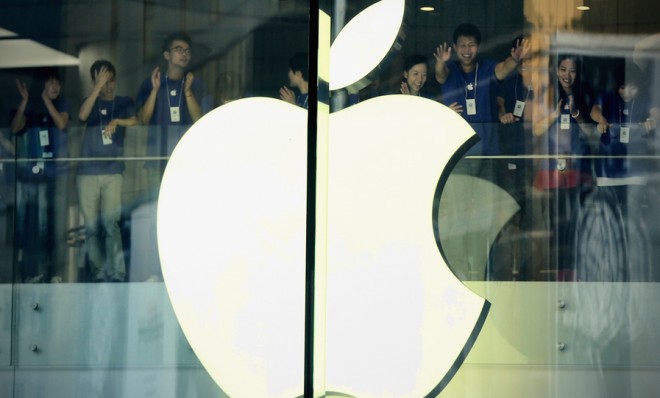What's crushing Apple's stock?
It could be gold prices... or that persistent, little-known Nashville trader with a not-so-good outlook on the company

A free daily email with the biggest news stories of the day – and the best features from TheWeek.com
You are now subscribed
Your newsletter sign-up was successful
And the roller coaster ride continues. After several weeks of gains, Apple's stock price tanked again this week, sliding to $427 from a recent high of $460.
Chutes and ladders has been the theme for the tech giant: Shares fell to a low of $385 in April, down 45 percent from its record high of $705 in September. Then prices rebounded more than 20 percent in May, after CEO Tim Cook announced $9.5 billion in Q1 profits, along with a $60 billion stock buyback program.
Yet here we go again — Apple's share price is tumbling and analysts are clamoring to figure out why. A look at three theories floating this week:
The Week
Escape your echo chamber. Get the facts behind the news, plus analysis from multiple perspectives.

Sign up for The Week's Free Newsletters
From our morning news briefing to a weekly Good News Newsletter, get the best of The Week delivered directly to your inbox.
From our morning news briefing to a weekly Good News Newsletter, get the best of The Week delivered directly to your inbox.
1. Gold prices are falling
As gold goes, so does Apple, says Joe Weisenthal at Business Insider. He points out that Apple is down 2 percent and gold is down 1.4 percent. "These moves are happening on a day when the market is basically flat. It's not an accident that they're diving together," he writes.
Weisenthal explains that before the crisis, Apple and gold were both practically immune to day-to-day market fluctuations. Both "seemed to exist in a world of their own rules, and their own returns," he says, and "Apple seemed disconnected form the hum-drum economy." That doesn't seem to hold true anymore:
Things are changing. Suddenly the market and the economy are looking better. This means that Apple no longer seems so special. Lots of companies have the ability to thrive. And with the economic improvement, the appeal of gold is limited too.
So Apple and gold move together. [Business Insider]
Check out the charts demonstrating the similar fluctuations of Apple and gold prices.
A free daily email with the biggest news stories of the day – and the best features from TheWeek.com
2. Investors are worried — and their SEC filings show it
Based on newly available 13Fs, the forms hedge funds file with the SEC revealing their current holdings, investors are skittish, and some analysts think the decisions they're making are spreading the fear. For example, David Tepper, founder and chief investment officer at the major hedge fund Appaloosa Management and Alpha magazine's top hedge fund earner in the world, reduced his stake in Apple by 41 percent. And Tepper isn't alone, says USA Today:
Hedge fund legend Julian Robertson showed his Tiger Management fund dumped its once-sizable position in the Mac computer maker. The SEC filing showed that Tiger owned zero shares of Apple at the end of the first quarter of 2013, vs. 42,125 shares at the end of the prior quarter. [USA Today]
3. David Trainer's mini-smear campaign
This week, Nashville trader David Trainer dropped by MoneyLife and CNBC to spread his conviction that Apple's true value is just $240 a share. Philip Elmer-DeWitt from Fortune thinks investors are paying attention to Trainer:
It's hard to believe a little-known Nashville trader with an obscure theory and a bizarre Apple valuation could move a market. But shortly after his media blitz began Tuesday, Apple's share price dropped more than $9. After his CNBC appearance Wednesday it fell another $21 to dip below $423 — thus wiping out two and a half weeks of gains. [Fortune]
Trainer's "obscure theory" centers around Return on Invested Capital, or ROIC, an equation that calculates a company's ability to spend capital on profitable investments. Comparing a company's ROIC with its cost of capital should give you a pretty good idea of how efficient it is.
At 271 percent, Apple's ROIC is actually outstanding. But Trainer argues the number is unsustainably high. For comparison, Trainer points out, Microsoft's ROIC is 75 percent, and Google's is 34 percent.
"Since [last year], the company's ROIC fell from 340 percent to 271 percent," Trainer explains on his blog. "Add the lack of innovation and issues with new products, and I see the recent drop in ROIC as a new trend. Without significant product differentiation, Apple cannot maintain the ultra high profit margins and ROICs."
Trainer's theory looks like a numerical expression of a widespread fear on Wall Street — that Apple's days of creating groundbreaking technology and banking unthinkable profits are over.
Carmel Lobello is the business editor at TheWeek.com. Previously, she was an editor at DeathandTaxesMag.com.
-
 ‘Those rights don’t exist to protect criminals’
‘Those rights don’t exist to protect criminals’Instant Opinion Opinion, comment and editorials of the day
-
 Key Bangladesh election returns old guard to power
Key Bangladesh election returns old guard to powerSpeed Read The Bangladesh Nationalist Party claimed a decisive victory
-
 Judge blocks Hegseth from punishing Kelly over video
Judge blocks Hegseth from punishing Kelly over videoSpeed Read Defense Secretary Pete Hegseth pushed for the senator to be demoted over a video in which he reminds military officials they should refuse illegal orders